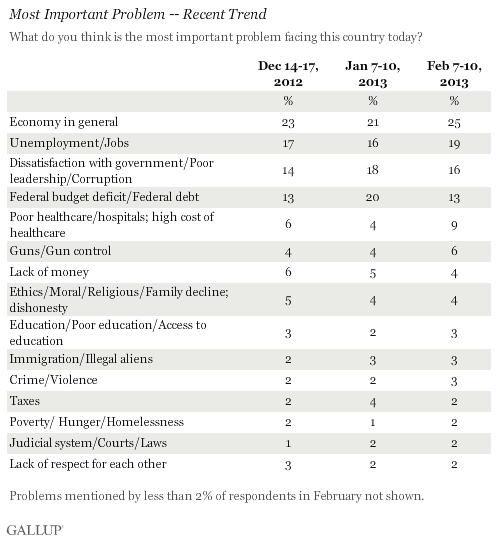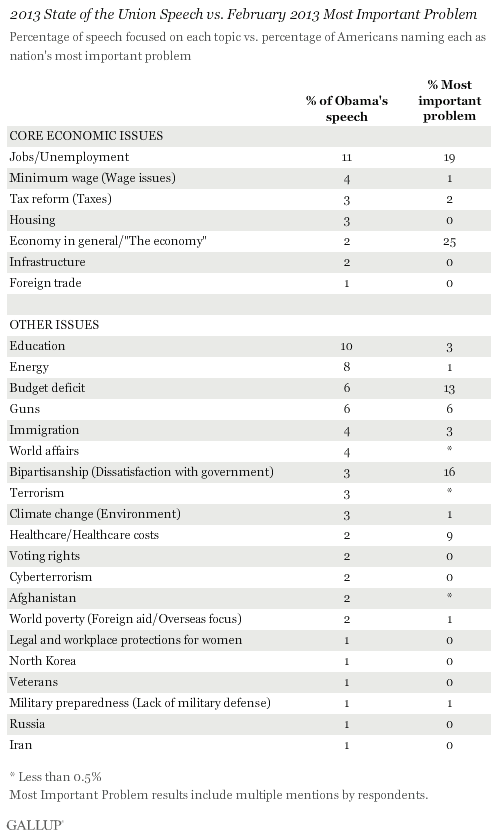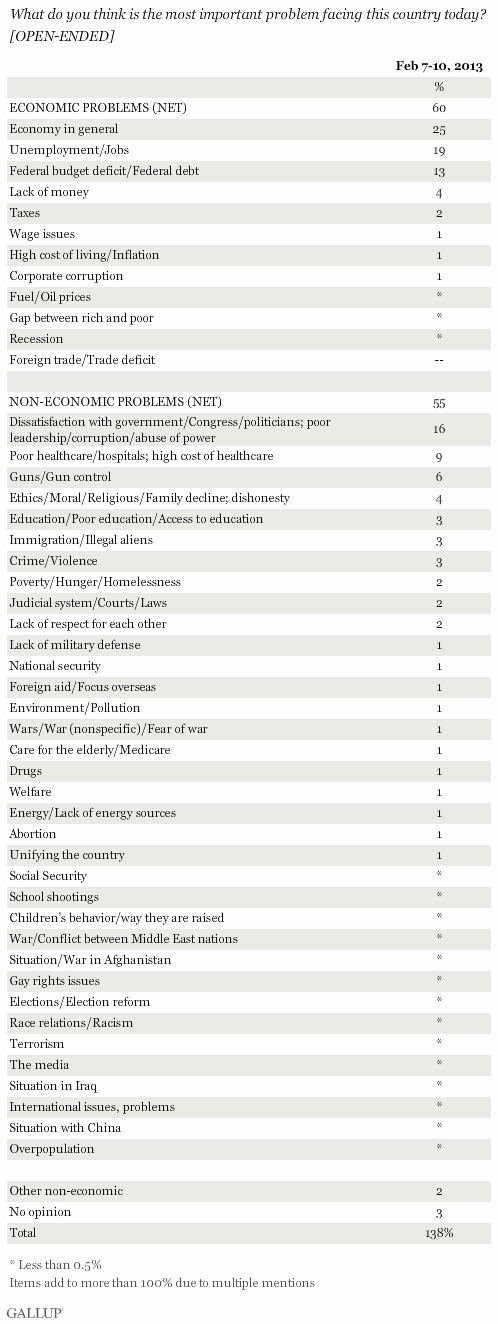PRINCETON, NJ -- Ahead of President Barack Obama's State of the Union address on Tuesday, Americans' concerns about the "most important problem" in the country remained largely entrenched compared with the previous month, with one in four mentioning the economy, followed by unemployment or jobs (19%), and then various issues related to poor government or leadership. At 13%, mentions of the federal budget deficit are back to where they were in December following a spike to 20% in January shortly after the conclusion of the New Year's "fiscal cliff" budget drama.

Healthcare, guns, "lack of money," ethics/moral decline, education, immigration, and crime lead the remaining set of issues that are mentioned by at least 2% of Americans. The full results can be found on page 2.
Obama's Emphasis Similar to -- but Not Perfectly Aligned With -- Americans' Concerns
The rank order of Americans' top national issue concerns is similar in some ways, but different in others, from the emphasis Obama placed on various issues in his State of the Union address. Gallup determined the latter by counting the number of words devoted to specific subjects in the president's well-categorized speech.
By Gallup's count, 27 issues were the focus of at least one specific paragraph in Obama's remarks. While the percentage of the speech that was devoted to each section is not directly comparable to the percentage of Americans naming each issue as the country's top problem, the rank orders provide a sense of the priority the president -- and the American public -- gives to each topic. It should be noted that the Most Important Problem results reflect more than one mention by respondents, possibly magnifying the percentages for top importance issues.
Obama tackled the subject of the nation's economy immediately after his introductory remarks, and ultimately devoted roughly one-quarter of the speech to core economic concerns spanning employment, the housing market, wages, and foreign trade, among other issues. This far outweighed his attention to any other specific issue in the 59-minute address, similar to Americans' emphasis on economic concerns as the nation's top problem. Americans may be more inclined than Obama to use the words "the economy" when referring to the economic challenges facing the country, but it is likely that Obama's multipronged treatment of the economy conveyed that he shares the same concern.
In reflecting on the nation's challenges, Obama put more emphasis in his speech than Americans do in response to the Most Important Problem question on education, energy, terrorism, and world affairs -- with the emphasis on the last particularly true when one considers Obama's discussion of relations with specific countries. He put less emphasis than Americans do on the budget deficit, problems with government leadership, and healthcare.

Additionally, Obama made passing reference in his speech to several specific issues -- some economic in nature, others not -- that are not present on Gallup's Most Important Problem list: voting rights, cyberterrorism, the nation's infrastructure, protections for women, and foreign trade.
Obama's focus on guns, immigration, taxes, and military preparedness closely approximated the percentage of Americans most concerned about these issues.
Seven additional issues are named by at least 2% of Americans as the nation's top problem but were not given any special treatment in Obama's speech. These include morals and ethics, crime, poverty, and the nation's judicial system.
Whether Obama's policy prescriptions on each issue align with the preferences of Americans naming each as the nation's top problem is a separate question, and one not addressed by this analysis.
Bottom Line
A comparison of Obama's State of the Union address and Americans' perceptions of the most important problem facing the country in February finds the speech more closely matching Americans' emphasis on some national issues than others. Americans and the president share a common emphasis on the economy in its various forms. At the same time, Obama's speech revealed a focus slightly different from the public's in terms of his heavy emphasis on education, followed by energy. Americans' secondary focus, by contrast, is on problems with government leadership and the federal budget deficit. Beyond these issues, it is clear that international matters occupy more of Obama's thoughts than Americans', and he is perhaps ahead of the public in his concern about emerging threats like crumbling national infrastructure and cyberterrorism.
Survey Methods
Results for this Gallup poll are based on telephone interviews conducted Feb. 7-10, 2013, with a random sample of 1,015 adults, aged 18 and older, living in all 50 U.S. states and the District of Columbia.
For results based on the total sample of national adults, one can say with 95% confidence that the margin of sampling error is ±4 percentage points.
Interviews are conducted with respondents on landline telephones and cellular phones, with interviews conducted in Spanish for respondents who are primarily Spanish-speaking. Each sample of national adults includes a minimum quota of 50% cell phone respondents and 50% landline respondents, with additional minimum quotas by region. Landline telephone numbers are chosen at random among listed telephone numbers. Cell phones numbers are selected using random digit dial methods. Landline respondents are chosen at random within each household on the basis of which member had the most recent birthday.
Samples are weighted to correct for unequal selection probability, nonresponse, and double coverage of landline and cell users in the two sampling frames. They are also weighted to match the national demographics of gender, age, race, Hispanic ethnicity, education, region, population density, and phone status (cellphone only/landline only/both, cellphone mostly, and having an unlisted landline number). Demographic weighting targets are based on the March 2012 Current Population Survey figures for the aged 18 and older U.S. population. Phone status targets are based on the July-December 2011 National Health Interview Survey. Population density targets are based on the 2010 census. All reported margins of sampling error include the computed design effects for weighting.
In addition to sampling error, question wording and practical difficulties in conducting surveys can introduce error or bias into the findings of public opinion polls.
View methodology, full question results, and trend data.
For more details on Gallup's polling methodology, visit www.gallup.com.

